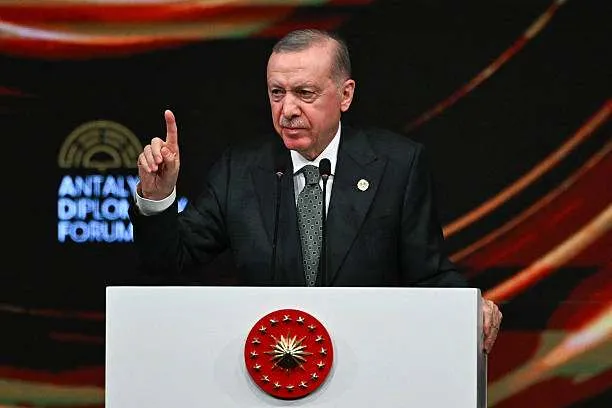Erdogan accuses Israel of undermining Syrian revolution
Turkish President claims Israel is destabilising post-Assad Syria by stirring internal divisions.
By Anna Fadiah and Hayu Andini
Turkish President Recep Tayyip Erdogan has made fresh headlines by taking direct aim at Israel, alleging that it is actively working to destabilise post-Assad Syria. Speaking at a high-level diplomacy forum on Friday in Antalya, Erdogan accused Israel of attempting to "dynamite the December 8 revolution" that ousted longtime Syrian ruler Bashar al-Assad, suggesting Israel is manipulating Syria’s ethnic and religious divisions to serve its own strategic goals. With this, Erdogan accuses Israel of undermining Syrian revolution—a bold claim that comes at a critical moment in Middle East diplomacy.
The Turkish leader, whose country has thrown its support behind Syria’s new leadership under Ahmed al-Sharaa and the Islamist-led coalition Hayat Tahrir al-Sham (HTS), did not mince words. “Israel is trying to dynamite the December 8 revolution by stirring up ethnic and religious affiliations and turning minorities in Syria against the government,” Erdogan declared.
These remarks arrive just as Turkish and Israeli officials have initiated technical discussions in Azerbaijan—the first formal contact between the two governments in months, aimed at preventing further escalation near their respective spheres of influence in Syria. Although military-level conversations have resumed, Erdogan clarified that these do not signal a thaw in political ties. Foreign Minister Hakan Fidan underlined that the resumption of talks “should not be interpreted as a move toward normalisation,” especially given the still-roiling conflict between Israel and Hamas in Gaza.
A fragile post-Assad transition
The Erdogan accuses Israel of undermining Syrian revolution narrative is deeply tied to Turkey’s geopolitical posture in the region. Following the fall of Assad in December—a seismic event that redefined the balance of power in the Levant—Ankara swiftly positioned itself as the chief patron of the new Syrian leadership. Ahmed al-Sharaa, who rose to prominence through the HTS-led coalition, enjoys Ankara’s support despite international concerns over HTS’s Islamist ideology and controversial past.
Turkey’s rationale is twofold: preventing the resurgence of pro-Assad forces while also curbing Kurdish separatist movements near its border. Erdogan believes that the revolution’s fragile success story is now at risk—not from internal factionalism alone, but from what he describes as Israel’s calculated interference.
“Israel does not want a strong, unified Syria emerging on its borders,” Erdogan said. “So it is sowing the seeds of fragmentation, just as it has done in other parts of our region.”
Military activity and regional tensions
Since Assad’s downfall, Israel has maintained a tense military presence around the Syrian frontier. Its stated aim is to prevent Iranian militias and Hezbollah operatives from gaining a foothold in the territory formerly held by Assad’s regime. This has included multiple airstrikes deep into Syrian territory and short cross-border incursions.
However, Turkey sees these moves differently. According to a senior Turkish defence official, Israel’s military actions have done more to destabilise Syria than secure Israeli territory. “There is a difference between defensive actions and interventions that jeopardise a country's sovereignty,” the official noted.
The comments by Erdogan and his administration now bring this growing tension into sharper focus.
Economic fallout and diplomatic freeze
Beyond military issues, Erdogan’s fiery rhetoric also reflects Turkey’s broader diplomatic stance. All trade with Israel has been suspended amid growing outrage in Turkey over Israel’s military actions in Gaza, which have caused thousands of casualties and sparked global protests.
Erdogan has consistently taken a hardline approach toward Israeli Prime Minister Benjamin Netanyahu, accusing him of war crimes and attempting to undermine peace efforts across the region. “This man does not want peace,” Erdogan said earlier this year. “He wants division, destruction, and domination.”
The suspension of trade has already impacted various sectors, including Turkish exports of textiles, machinery, and chemicals to Israel. Meanwhile, tourism—once a bright spot in bilateral relations—has seen a steep drop, with both nations advising caution for travel.
Future of Turkish-Israeli engagement
Even though the two sides met in Azerbaijan this week, expectations for a reset in Turkish-Israeli relations remain low. “There is currently no appetite in Ankara for full diplomatic normalisation,” a senior Turkish diplomat said, requesting anonymity. “What we’re trying to do is avoid accidental escalation—not rebuild trust.”
The Erdogan accuses Israel of undermining Syrian revolution narrative will likely continue to dominate Turkey’s regional messaging in the months ahead. It appeals strongly to Erdogan’s base, especially among conservative and nationalist segments who view Turkey’s regional role as one of moral and strategic leadership.
Still, analysts warn that continuing down this confrontational path carries risks—not just for Turkish-Israeli ties, but for broader stability in a region already on edge.
International response muted—for now
International reaction to Erdogan’s comments has so far been muted. Most Western governments, while supportive of Israel’s right to self-defense, remain wary of overt involvement in Syria following years of entanglement during Assad’s rule. Russia and Iran, both previously Assad’s key backers, have also remained silent—possibly recalibrating their own positions amid Syria’s changing political landscape.
Israel, for its part, has neither confirmed nor denied Erdogan’s accusations. Instead, it issued a brief statement saying its military activities are aimed solely at “neutralising threats near our northern border.”
Whether or not Erdogan accuses Israel of undermining Syrian revolution becomes a lasting diplomatic wedge remains to be seen. But for now, Erdogan has clearly signalled that Turkey sees itself not just as a neighbour to Syria—but as a guardian of its revolutionary outcome.
A new regional chapter
As Turkey and Israel continue their cautious diplomatic dance, one thing is clear: Syria’s post-Assad future is still being written. And with Erdogan staking his credibility on defending the so-called “December 8 revolution,” the stakes for all players involved have never been higher.
Whether the tensions escalate or ease will depend not just on military manoeuvres or diplomacy—but on whether each side is willing to see Syria not as a battlefield for influence, but as a nation seeking stability after years of conflict.
In the meantime, Erdogan’s voice will remain loud—and his accusations pointed.

